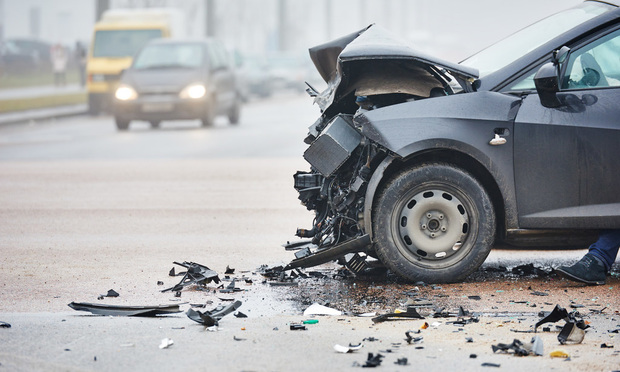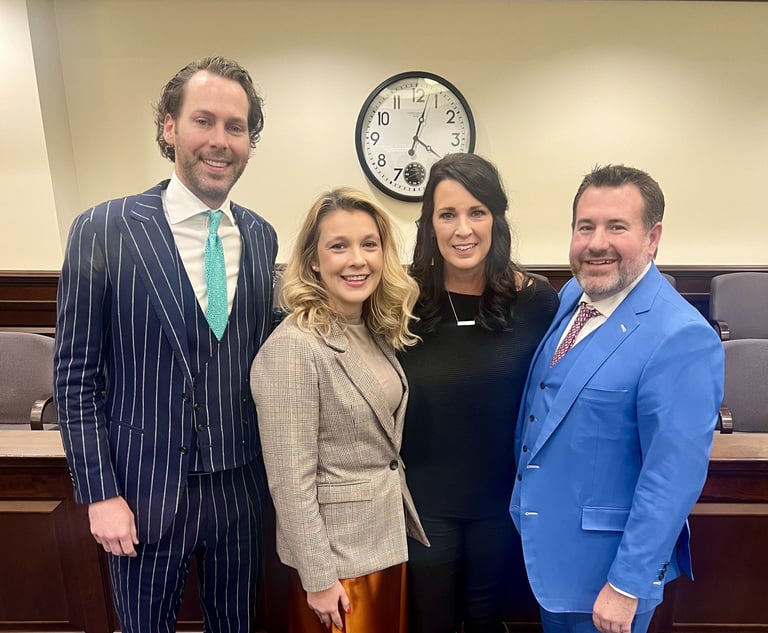'An Assault on the Industry': Pa. High Court Mulls $21M Bad-Faith Verdict Against Nationwide
Appellate counsel for the plaintiff argued that the trial judge "lived" through Nationwide's aggressive litigation strategies, and so the court should have relied on his findings.
November 21, 2019 at 03:10 PM
4 minute read
 Photo: Shutterstock
Photo: Shutterstock
A trial judge's decision to slam an insurance carrier with a $21 million bad-faith award was an assault on the industry and the state Superior Court was well within reason to toss the verdict, an attorney representing Nationwide argued before the Pennsylvania Supreme Court in the closely watched case, Berg v. Nationwide.
Dechert attorney Robert Heim told six judges of the Supreme Court during its Harrisburg session Thursday that Berks County Court of Common Pleas Judge Jeffrey Sprecher's decision awarding the plaintiffs $18 million in bad-faith damages and $3 million in attorney fees was completely divorced from the evidence in the record and showed clear bias.
Sprecher's scathing 2014 opinion announcing the decision was a "flat-out assault on the [insurance] industry," Heim told the justices.
"You can't read these rants and ravings as being fair and impartial," Heim said, later adding, "The [Superior Court] credited the trial judge as much as they could … but the evidence wasn't there."
Heim made the arguments in an effort to have the Supreme Court affirm the Superior Court's decision from April 2018 to toss the multimillion-dollar verdict and enter judgment for the defense.
Justice Christine Donohue recused from the argument session Thursday.
However, according to Pittsburgh attorney Kenneth Behrend, who represented plaintiffs Daniel and Sharon Berg, the Superior Court's decision went beyond the proper appellate scope of review, and did not give proper deference to the trial court. According to Behrend, Sprecher "lived" through Nationwide's aggressive litigation strategies, and so the court should have relied on his findings.
"The judge got to live with these litigation strategies," Behrend told the court. "There were observations made in a first-hand basis by the trial judge."
The case arose after plaintiffs took their damaged 1996 Jeep Grand Cherokee to a facility participating in the insurer's "Blue Ribbon Repair Program," where one appraiser recommended that the vehicle be totaled. The Bergs, however, alleged that Nationwide Mutual Insurance reversed that appraisal without informing them and then ordered the vehicle sent to another repair facility. After allegedly finding problems with the car, the Bergs argued that, despite the attempted repairs, Nationwide knowingly returned them their vehicle with an unsound structural frame in order to avoid paying for a new vehicle.
After a jury found Nationwide violated the Unfair Trade Practices and Consumer Protection Law, the trial judge granted a directed verdict for Nationwide, but the Superior Court eventually reversed, giving the plaintiffs another chance to try their bad-faith claims. In June 2014, Sprecher issued his $21 million bad-faith verdict, along with a lengthy and scathing opinion, finding that "Nationwide strong-armed its own policyholder rather than negotiating in good faith to compensate plaintiff for the loss suffered in the automobile collision."
A three-judge Superior Court panel reversed, and the Supreme Court agreed to take up the case in April.
Much of the argument session Thursday focused on determining exactly where the bad faith took place, and whether insurance carriers should act as a de facto guarantor of a repair shop if it tells its insured that the vehicle needs to be repaired, rather than replaced.
Behrend said that is the law and has been the law for years.
"You want to repair it, you need to repair it to safety standards," Behrend said. "If the carrier elects to repair it, they're responsible for it."
Heim, however, said the carrier could be considered a guarantor to the extent that the insured are reimbursed, but, he said, the repairs were not done at Nationwide's direction and the company had been led to believe the car was in a safe condition before it was released.
"Nationwide's duty was to pay," Heim said. "That's their duty. There's no duty beyond that."
This content has been archived. It is available through our partners, LexisNexis® and Bloomberg Law.
To view this content, please continue to their sites.
Not a Lexis Subscriber?
Subscribe Now
Not a Bloomberg Law Subscriber?
Subscribe Now
NOT FOR REPRINT
© 2025 ALM Global, LLC, All Rights Reserved. Request academic re-use from www.copyright.com. All other uses, submit a request to [email protected]. For more information visit Asset & Logo Licensing.
You Might Like
View All
Philadelphia Eagles 0-2 in Attempts to Recover Insurance on COVID-Related Losses
4 minute read
High Verdicts and Venue Rule Land Pa. Courts on Top of 'Judicial Hellhole' List
5 minute read

Judge Approves $667K Settlement Against Independence Blue Cross for Unpaid, Pre-Shift Computer Work
4 minute readLaw Firms Mentioned
Trending Stories
Who Got The Work
J. Brugh Lower of Gibbons has entered an appearance for industrial equipment supplier Devco Corporation in a pending trademark infringement lawsuit. The suit, accusing the defendant of selling knock-off Graco products, was filed Dec. 18 in New Jersey District Court by Rivkin Radler on behalf of Graco Inc. and Graco Minnesota. The case, assigned to U.S. District Judge Zahid N. Quraishi, is 3:24-cv-11294, Graco Inc. et al v. Devco Corporation.
Who Got The Work
Rebecca Maller-Stein and Kent A. Yalowitz of Arnold & Porter Kaye Scholer have entered their appearances for Hanaco Venture Capital and its executives, Lior Prosor and David Frankel, in a pending securities lawsuit. The action, filed on Dec. 24 in New York Southern District Court by Zell, Aron & Co. on behalf of Goldeneye Advisors, accuses the defendants of negligently and fraudulently managing the plaintiff's $1 million investment. The case, assigned to U.S. District Judge Vernon S. Broderick, is 1:24-cv-09918, Goldeneye Advisors, LLC v. Hanaco Venture Capital, Ltd. et al.
Who Got The Work
Attorneys from A&O Shearman has stepped in as defense counsel for Toronto-Dominion Bank and other defendants in a pending securities class action. The suit, filed Dec. 11 in New York Southern District Court by Bleichmar Fonti & Auld, accuses the defendants of concealing the bank's 'pervasive' deficiencies in regards to its compliance with the Bank Secrecy Act and the quality of its anti-money laundering controls. The case, assigned to U.S. District Judge Arun Subramanian, is 1:24-cv-09445, Gonzalez v. The Toronto-Dominion Bank et al.
Who Got The Work
Crown Castle International, a Pennsylvania company providing shared communications infrastructure, has turned to Luke D. Wolf of Gordon Rees Scully Mansukhani to fend off a pending breach-of-contract lawsuit. The court action, filed Nov. 25 in Michigan Eastern District Court by Hooper Hathaway PC on behalf of The Town Residences LLC, accuses Crown Castle of failing to transfer approximately $30,000 in utility payments from T-Mobile in breach of a roof-top lease and assignment agreement. The case, assigned to U.S. District Judge Susan K. Declercq, is 2:24-cv-13131, The Town Residences LLC v. T-Mobile US, Inc. et al.
Who Got The Work
Wilfred P. Coronato and Daniel M. Schwartz of McCarter & English have stepped in as defense counsel to Electrolux Home Products Inc. in a pending product liability lawsuit. The court action, filed Nov. 26 in New York Eastern District Court by Poulos Lopiccolo PC and Nagel Rice LLP on behalf of David Stern, alleges that the defendant's refrigerators’ drawers and shelving repeatedly break and fall apart within months after purchase. The case, assigned to U.S. District Judge Joan M. Azrack, is 2:24-cv-08204, Stern v. Electrolux Home Products, Inc.
Featured Firms
Law Offices of Gary Martin Hays & Associates, P.C.
(470) 294-1674
Law Offices of Mark E. Salomone
(857) 444-6468
Smith & Hassler
(713) 739-1250





